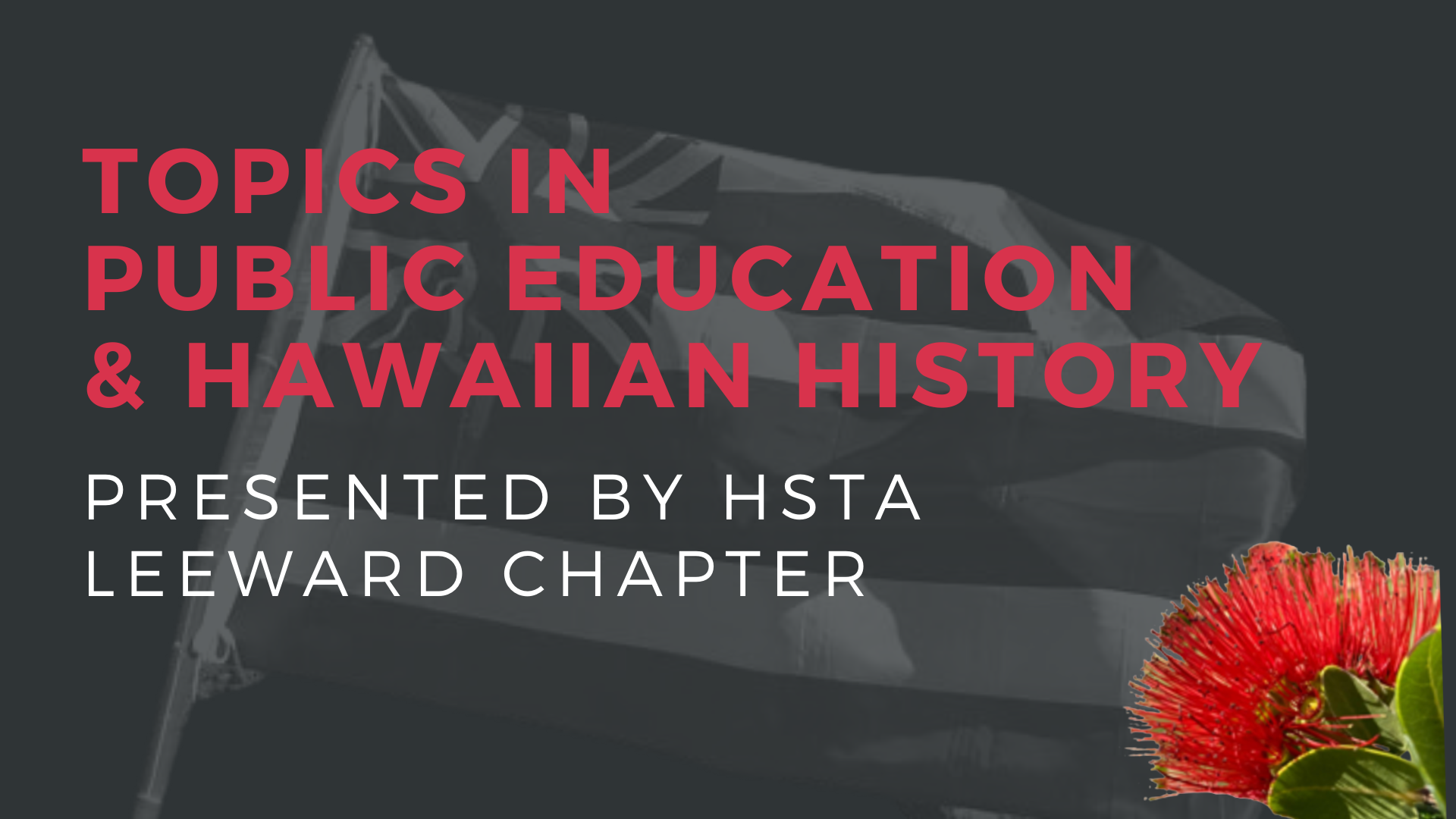Enjoy this series that explores the history of education in honor of Lā Kūʻokoʻa
Updated: November 23, 2021
As educators across Hawaiʻi commemorate Lā Kūʻokoʻa throughout the month of November, the Hawaiʻi State Teachers Association Leeward Chapter explores a history of education that lifts up schools and educators who ground their work in the unique history and knowledge systems of Hawaiʻi, all made possible by years of teacher and community organizing.
Whether you are new to Hawaiʻi or an experienced educator in a field discussed in this series, you are bound to learn something new by watching these sessions. Please enjoy this series that celebrates education and explores how we build power to create “The Schools Our Keiki Deserve.”
Public education in the Hawaiian Kingdom
Date: Nov. 1, 2021
The famed literacy rates in 19th century Hawaiʻi speak to education as a national project. Join scholars and teachers of Hawaiian history to discuss national education efforts in the Hawaiian Kingdom and why educators are working to update how we teach history in public schools today.
Speakers:
- Nālani Balutski, Hawaiʻinuiākea School of Hawaiian Knowledge, University of Hawaiʻi at Mānoa
- Rian Tong, social studies teacher, James Campbell High School, Ewa Beach
- Dr. ʻUmi Perkins, history teacher, Kamehameha Schools, Kapālama
A history of Hawaiian language immersion education
Date: Nov. 8, 2021
The reclamation of Hawaiian language in public schools is a decades-long effort that began in Kekaha, Kauaʻi, and now spans across the islands. Learn this story of community strength and organizing. What is the impact of kula kaiapuni (Hawaiian language immersion schools) and what are the current efforts to expand Hawaiian immersion?
Speakers:
- Kahele Dukelow, University of Hawaiʻi Maui College
- Rain Kahula Yong, teacher, Ke Kula o Nawahīokalaniʻōpuʻu, Ka Papahana Māʻilikūkahi, Nānākuli
- Allie Kaʻaloa, teacher, Nānākuli High and Intermediate; parent, Ka Papahana Māʻilikūkahi, Nānākuli
- Andrea Dias Machado, parent, Ke Kula Kaiapuni o Waiau, Pearl City
A history of Hawaiian-focused public charter schools
Date: Nov. 15, 2021
As Hawaiian knowledge was marginalized in the public schools system throughout the 20th century, Hawaiian-focused public charter schools were established as a means of building entire schools that center Hawaiian culture, history, politics and pedagogy. Hear from someone who helped found a Hawaiian-focused public charter school as well as current kumu (educators) talk about the role these schools play in our communities.
Speakers:
- Dr. Noelani Goodyear-Kaʻōpua, University of Hawaiʻi at Mānoa
- Pumehana Henderson, registar, Ka Waihona O Ka Naʻauao
- Kanoe Cadina, curriculum coordinator, Ka Maile Academy
Hoʻopulapula Academy: ʻĀina-based education at Nānākuli High & Intermediate
Date: Nov. 22, 2021
Teachers in Leeward and across Hawaiʻi are turning to the ʻāina to create curriculum across various subjects that facilitate student connection to place and ancestral knowledge, while developing skills that will support greater food and health independence in their communities. See how educators across the Leeward Chapter are doing this important work.
Speaker:
- John “Oni” Ezell, teacher, Hoʻopulapula Academy, Nānākuli High & Intermediate School
What is Lā Kūʻokoʻa?
Lā Kūʻokoʻa marks the day in 1843 that England and France signed the Anglo-French proclamation, which established the Hawaiian Kingdom as an independent and internationally recognized country, a complicated but celebrated achievement in an age of explicit global colonialism.
The holiday was celebrated as a national holiday each year from there on until following the overthrow when the provisional government banned all national holidays and replaced Lā Kūʻokoʻa with the American holiday of Thanksgiving.
In the past decade, Lā Kūʻokoʻa has enjoyed a revival in Hawaiʻi. This revival results from the growth of Hawaiian historical education in public schools and the University of Hawaiʻi; the restoration of Hawaiian cultural practices; and the revitalization of the Hawaiian language, and Hawaiian language archival research.
Throughout the islands, the month of November is filled with programs and celebrations that focus on Hawaiian history and the question of Kūʻokoʻa, including expansive notions of independence, such as educational, food, and natural resource management.

